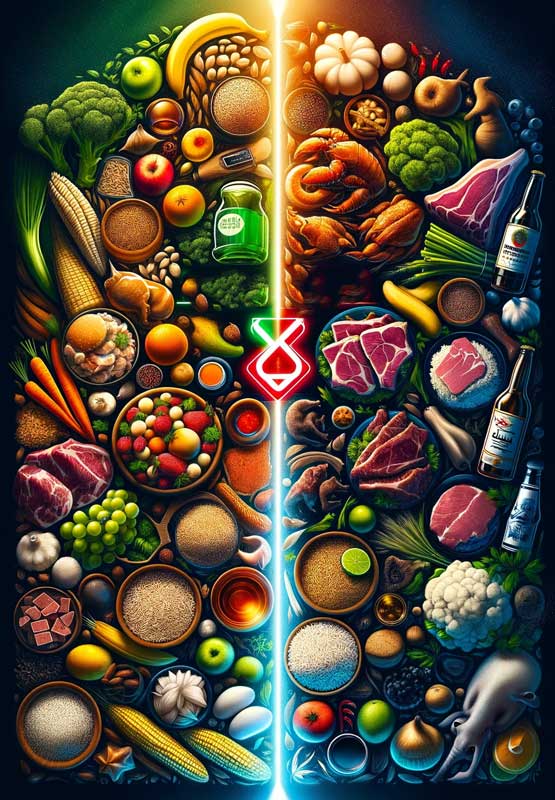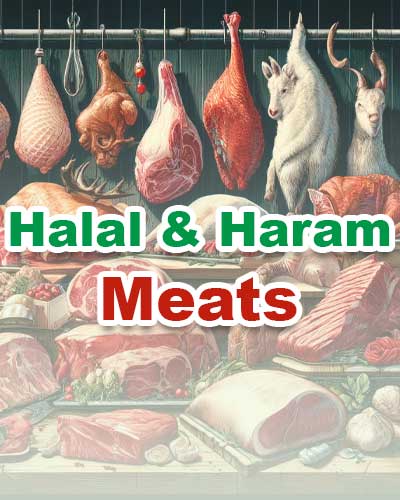Halal vs. Haram: What Are the Differences?
Welcome to Best Istikhara, your ultimate guide for understanding the intricate balance between Halal and Haram within the Islamic faith. In our continuous effort to enlighten and serve our community, we have dedicated a substantial portion of our content to navigating the complex world of Islamic dietary laws and ethical guidelines. Whether you’re at a crossroads trying to determine the permissibility of a food item, a restaurant, or any other aspect of daily life through an Islamic lens, just bookmark our website. Here, you’ll find an exhaustive resource tailored to assist you in making informed decisions aligned with your faith. In this comprehensive pillar content, we will delve deep into the essence of what constitutes Halal and Haram, unraveling the differences and providing you with the knowledge to recognize permissible options in various scenarios. By the end of this essay, you’ll be equipped with the insights needed to discern whether something is conducive to consumption or practice within Islam.

Our Latest Posts About Halal & Haram
Definition of Halal & Haram
In the Islamic faith, the concepts of Halal and Haram serve as fundamental guidelines governing the ethical, dietary, and social conduct of Muslims. Halal, an Arabic term, translates to “permissible” or “lawful” in English, encapsulating all actions, deeds, and consumables allowed under Islamic law. Conversely, Haram, meaning “forbidden” or “prohibited,” denotes everything Islam explicitly bans due to its potential harm or impurity to Muslims’ physical, moral, or spiritual well-being. These categories extend beyond food to include behavior, finances, clothing, and more, shaping a Muslim’s lifestyle to align with divine guidance.
Differences Between Halal & Haram Food
The distinction between Halal and Haram food is a cornerstone of Islamic dietary laws, reflecting a profound commitment to cleanliness, purity, and ethical treatment. Halal foods are those that Allah has explicitly allowed; they include all fruits, vegetables, grains, fish, and meats prepared according to Islamic law. Haram foods are explicitly forbidden and include alcohol, pork, carnivorous animals, blood, and any meat not slaughtered in the name of Allah. The Halal and Haram classifications are not arbitrary; they are deeply rooted in considerations of health, ethics, and spiritual cleanliness.
What Does Quran Says About Halal & Haram?
The Quran, Islam’s holy scripture, provides clear directives on Halal and Haram, serving as a comprehensive guide for Muslims. Verses such as Surah Al-Baqarah 2:168-169 instruct Muslims to consume what is lawful and good on the earth and to avoid following the footsteps of Satan, for he is to them a clear enemy, guiding them towards evil and immorality. These teachings are not just dietary laws but principles meant to uphold a disciplined, moral, and healthy lifestyle, ensuring that Muslims maintain purity in consumption and conduct.
Types of Halal Foods
Halal foods encompass a wide range of consumables deemed permissible under Islamic law. These include:
- Fruits and Vegetables: All fruits and vegetables are Halal, provided they are not prepared with alcohol or other Haram substances.
- Grains: All natural grains such as wheat, rice, barley, and corn are permissible.
- Fish and Seafood: Most scholars agree that all fish and seafood are Halal.
- Dairy Products: Milk, cheese, and yogurt are Halal when sourced from permissible animals and free from Haram contamination.
- Meat: Meat from Halal animals slaughtered in the name of Allah, following the Islamic Zabiha method.
Types of Haram Foods
Haram foods, strictly prohibited in Islam, include:
- Pork and Its By-Products: The Quran explicitly forbids pork, making it the most well-known Haram food.
- Alcohol: All forms of intoxicants, primarily alcohol, are Haram as they impair judgment and lead to immoral behavior.
- Carnivorous Animals and Birds of Prey: Animals that feed on meat and possess fangs, and birds that have talons, are forbidden.
- Blood: Consuming blood in any form is prohibited.
- Animals Dead Prior to Slaughtering: Animals that die of themselves (not slaughtered) are not permissible.
Why Should Muslims Eat Halal Foods?
Eating Halal foods is not merely about following dietary laws but embodying a holistic approach to purity, ethics, and health. It signifies obedience to divine commandments, ensuring that what a Muslim consumes is clean, wholesome, and ethically sourced. This obedience nurtures spiritual growth, discipline, and moral integrity, fostering a community rooted in respect for creation and Creator alike.
Which Animals’ Meats Are Halal?
Islamic law permits the consumption of meat from several animals, provided they are Zabiha slaughtered. These include cattle, sheep, goats, camels, deer, and certain birds. The animal must be healthy at the time of slaughter, and the process should be carried out with a swift, clean cut to the throat while invoking the name of Allah. This method ensures the animal’s welfare and that the meat is pure and permissible.
How to Identify Halal & Haram Foods by Yourself?
Identifying Halal and Haram foods requires mindfulness and a proactive approach. Here are some tips:
- Learn the Basic Rules: Familiarize yourself with the Quranic injunctions and Hadiths regarding permissible and forbidden foods.
- Look for Certifications: Rely on Halal certifications by reputable organizations for processed foods and eateries.
- Ask Questions: When in doubt, inquire about the ingredients and preparation methods used in foods.
- Use Technology: Leverage apps and websites dedicated to Halal food guidance.
- Understand Labeling: Learn to read labels for hidden Haram ingredients like gelatin, enzymes
, wholesome, and spiritually fulfilling life. By adhering to these principles, Muslims not only ensure that their consumption practices are in line with Islamic teachings but also promote a lifestyle that is conscious of health, ethics, and the environment.
Eating Halal as a Spiritual Practice
For Muslims, eating Halal is not just a matter of physical health but a spiritual practice that reinforces their connection to Allah. It’s a daily reaffirmation of their faith and obedience to divine commandments. This practice goes beyond avoiding Haram foods; it’s about actively seeking out that which is pure and permissible, thereby purifying one’s body and soul. The act of choosing Halal is a form of worship, a demonstration of a Muslim’s commitment to living according to the principles laid out in the Quran and Sunnah.
The Global Impact of Halal Consumption
The global demand for Halal foods has not only heightened awareness about Islamic dietary laws but also encouraged many non-Muslims to consider Halal options due to their ethical sourcing and preparation. This has led to a broader understanding and respect for Islamic practices around the world, fostering a sense of inclusivity and mutual respect among diverse communities. Moreover, the Halal industry’s emphasis on cleanliness, quality, and ethical treatment of animals resonates with contemporary concerns about food safety, animal welfare, and sustainability.
Navigating Challenges and Misconceptions
Despite the clear guidelines provided in Islam, Muslims may sometimes face challenges in identifying Halal foods, especially in non-Muslim majority countries. Misconceptions about Halal being restrictive or unnecessarily complicated can also arise. However, the essence of Halal is to facilitate ease and purity in a Muslim’s life. Education and dialogue are key to overcoming these challenges, as they help dispel misconceptions and highlight the benefits of Halal consumption for both individuals and communities.
Community and Support in Halal Practices
The Muslim community plays a crucial role in supporting its members to adhere to Halal practices. Mosques, Islamic centers, and Halal certification bodies provide resources, education, and guidance to help individuals make informed choices. Community events and Halal food festivals also offer opportunities to celebrate and learn about the rich diversity of Halal cuisine. Through community support, Muslims can navigate the complexities of maintaining a Halal diet with confidence and ease.
Conclusion: A Call to Mindful Consumption
In embracing the principles of Halal and Haram, Muslims are invited to engage in mindful consumption that respects the sanctity of life, upholds ethical standards, and promotes physical and spiritual well-being. This mindful approach to eating is not just a personal choice but a collective expression of faith that impacts the individual, community, and the broader world. By adhering to Halal, Muslims contribute to a culture of respect, integrity, and consciousness that transcends dietary laws, embodying the universal Islamic values of compassion, cleanliness, and ethical living.
As we’ve explored the depths of Halal and Haram, their significance in Islamic faith, and their impact on a Muslim’s life, it’s clear that these dietary laws are about much more than what is consumed. They are about living a life in harmony with divine will, nurturing a healthy body, a pure heart, and a connected community. Best Istikhara remains committed to guiding you through this journey, offering insights, resources, and support to help you live a fulfilling Halal lifestyle. Together, we can embrace these principles not only as a path to spiritual growth but as a means to cultivate a better world for all.







